Final report for YENC19-143
Project Information
Our goal was for kids in first through fifth grades to learn about sustainable agriculture through hands-on activities with Teter Organic Farm’s farm manager, interviewing several agriculture professionals, and creating a farm to table meal for their families, all in a fun summer camp setting.
We used the following lesson plans:
Day 1: Getting to know the farm and each other
8:30am - 9:00am: Camper check-in (Lodge)
MaryEllen: Camper check-in table
Macy: Med check-in table
Courtney: Teter parking lot, welcoming, directing to lodge for
Check-in (8am-9:30am)
Alex & Brittany: Receiving campers after checked in. Make name tags (tags, yarn, paint
pens); start journal decorating
Offer snack for any hungry camper
9:00am-9:30am: Welcome (Grassy area between shelter & playground) (Rain location: Lodge)
- Welcome everyone!
Introduce staff; we are so glad you are here
Celebrate: Cheer (repeat after me) Staff lead Day 1; then variations other days
Hey, hey, heeeeyy, let’s celebrate another day
Woo, hoo, hooooo, let’s grow together me and you
Bam bam baaaam, let’s take care of this precious land
Teeeeter Farm Camp, oh yeah!
- Focus (be here, be now) Yoga: kid yoga- (3-5 min)
- Overview of day (highlights)
- Review expectations: quick counselor enactments
- Connect (with each other): farm-hand shake (who wants to share their fancy handshake?) AND
- Commit (how we grow): Today I am going to… (in head or with each other)
- Give examples to encompass everything: persevere through difficult tasks; focus on what is at hand; make a new friend, try something new, etc.
- Counselors check in at lunch and end of day: how are commitments going?
9:30am-11:30am: Hay wagon (or walking, if wet) tour with Jonah (learn names on hay wagon tour) ALL TOGETHER
While at greenhouse: pot up an herb to bring home. In field: harvest one of the crops. At hoop house: pick bitter re-growth lettuce to bring to compost
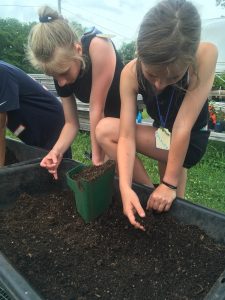
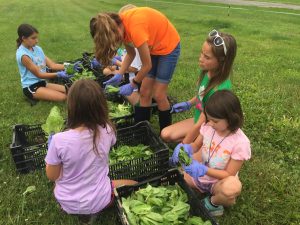
WATER break
11:30am-noon: Interview questions for week’s guests- Shelter(Brittany break)
Briefly talk about who will be visiting farm camp this week.
Create 4 questions to ask each guest (ones that they won’t necessarily cover in their
chat with us) (color code paper for each guest)
Keith O’Dell (Worm Compost guy)
Girl Scout (Tara Boyd and sister Lena Boyd, chicken keepers)
Beekeepers (Barry and Ann McNulty)
Anita Hagen (Hamilton County Harvest Food Bank)
Conni Kolb (Farmer: cows)
12noon-12:30pm: LUNCH w/ counselors: (Shelter, playground)
Taste a new herb, camp songs. Commitment check-in
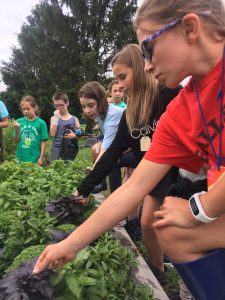
MESA: vlog: interview any camper who wants to share something new to them from
Hayride
12:30-1:00pm: Safety walk / Severe weather drill (Alex break)
Show red-painted areas to keep out; poison ivy and Virginia creeper to the left of the Lodge; walk very short trail right there to practice our rule of staying on the trail (WHY), staying with group, and tell them they will be with an assigned counselor beginning Day 2)
1:00pm-1:30pm: Scavenger hunt to find items in morning hayride tour locales. (printout from Jonah-) Campers can use these items later to decorate journals.
1:30pm-2:30pm: Split campers into 2 groups; FLIP these 2 activities (30 minutes at each):
Owls and Crows from Nature Games doc. (Courtney break) (downhill from volleyball) Use info from hayride tour with Jonah.
Greenhouse planting: each camper transplants an herb start into a 3 inch pot. Take home.
2:30pm-3:15pm: (location: counselor’s choice) Snack; Free play; Finish journal decorating and writing/drawing;
Circle time: reflecting in groups
(Use items from scavenger hunt to tape to front of journal if they like.) (Journals, colored pencils, markers, items from scavenger hunt, construction paper, tape)
3:15pm-3:30pm: (btwn shelter and playground) Whole group wrap up, cheer
3:30pm-3:45pm: (Lodge) Camper checkout. MaryEllen receives parents, Macy retrieves campers from Alex and Brittany’s groups.
(see below for counselor discussion at end of day)
3:45pm-4:15pm: Counselors discuss campers and form groups for rest of week
What did you notice? Leaders, quieter campers, overbearing, doers, engagement, those holding back, direction followers, who needs more guidance?
Day 2: Soil and worms and chickens- oh my!
At Check in: Campers go to assigned counselor
9:00am-9:10am: Welcome/Overview all together but sitting in groups with assigned counselor (Lodge)
Welcome back!
Celebrate: Cheer
Hey, hey, heeeeyy, let’s celebrate another day
Woo, hoo, hooooo, let’s grow together me and you
Bam bam baaaam, let’s take care of this precious land
Teeeeter Farm Camp, oh yeah!
Focus (be here, be now) kid yoga
Circle connection game
9:10am-9:30am: Morning connecting: in groups (counselors choose a spot close by)
Celebrations
Overview of day
Commitments
9:30am-10:00am: (shelter)
- GUEST: Keith O'Dell, Castaway Compost. Presentation, kids interview.
- HOOPHOUSE: pull bolted lettuce, put in boxes to compost
ALEX’s group: FIRST: Keith O’Dell:
BRITTANY’s and COURTNEY’s group: FIRST: hoophouse.
10:00am-10:30am: SAME AS ABOVE, BUT SWAP
10:30am-11:00am: ALL: bring boxes of bolted lettuce to compost pile; toss onto pile. Then play or short hike. (Courtney break)
11:00am-11:30am: water + storytime: Carl and the Meaning of Life (story about a worm and how his purpose fits in with other creatures’ purposes) (chapel area or Lodge, if rain) (Brittany break)
11:30am-12:00pm: (shelter/ playground/grass) LUNCH w/ counselors: camp songs. Commitment check-in (MESA: grab hand shovels from barn)
12:00pm-1:00pm: (start in shelter) GUEST: Andrew Fritz, HCSWCD: Soil and water investigation (All groups) (create path from field to wooded area, then close to river. Hand shovels)
Andrew Fritz’s soil and water investigation:
He will bring samples of clay, sand, silt and humus for kids to see, feel. Will talk about them as components of soil. Then we will explore the soil onsite, dig, hands in ground, discuss. We will travel from grassy area/field to wooded area to toward the river and discover how the soil changes.
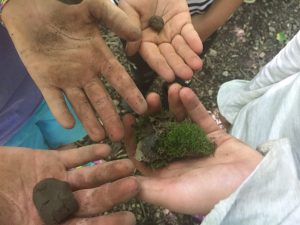
1:05pm-1:35pm: (Chicken area) Chicken Chat / water + storytime (2 groups)
- Tara or Lina Boyd will give a chicken chat and demonstrate chicken chores
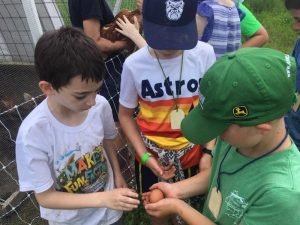
Campers learn how chickens contribute to the farm. 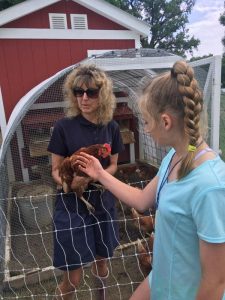
Campers learn how to care for chickens.
ON WAY TO CHICKEN TALK: pick up boxes of veggie scraps for chickens to eat. At end, bring surplus to compost pile.
- MESA will read Chicken Talk (humorous story about chickens) at shelter + water break for kids.
ALEX’s and COURTNEY’s group: FIRST: Chicken Chat
BRITTANY’s group: FIRST: water + storytime
1:40pm-2:10pm: SWAP above (ALEX break)
2:10pm-2:55pm: (begin at shelter) Prep for community meal: (Sun print materials, colored cardstock for poetry wall, vlog recording) (OR Free play, if needed!)
Kids go to each station for 15 minutes
Begin making sun prints for decoration
Begin poetry wall (possible here- poetry walk- in nature games doc)
vlogtime: what are the most important things we want to share with the world from Farm Camp today?
2:55pm-3:20pm: (Counselors choose location) Afternoon circle time in groups: snack, journal time (ie: fave part of day)+ group connection / reflection (ideas for groups to bond / create something to share at meal: create farm handshakes, farm rap, farm chant, farm dance)
3:20pm-3:30pm: (between shelter and playground) Whole group wrap up, cheer
3:30pm: (lodge): Camper checkout: counselors with campers, Macy and MaryEllen checking out
Day 3: It takes a natural village to make a farm work
At Check in: Campers go to assigned counselor (campers work on journals and/or poetry while waiting for all to assemble)
9:00am-9:10am: Welcome/Overview all together but sitting in groups with assigned counselor (Lodge)
Welcome back!
Celebrate: Cheer
Hey, hey, heeeeyy, let’s celebrate another day
Woo, hoo, hooooo, let’s grow together me and you
Bam bam baaaam, let’s take care of this precious land
Teeeeter Farm Camp, oh yeah!
Focus (be here, be now) kid yoga
9:10am-9:30am: Morning connecting: in groups
Celebrations
Overview of day
Commitments
Macy & MaryEllen bring helpers to help load in
9:30am-10:00am: (2 groups)
- GUEST: Beekeeper Barry or Ann McNulty (at shelter)
- Plant herb starts in Peace Garden. (Week one: campers planted cover crop seeds including one that attracts pollinators)
ALEX: First: planting herbs
BRITTANY and COURTNEY: First: Beekeepers
(Depending on if Jonah has field work for kids, we may all do the beekeeper together and then field work together) Broadcast cover crop seeds and harvest kale (did this first week)
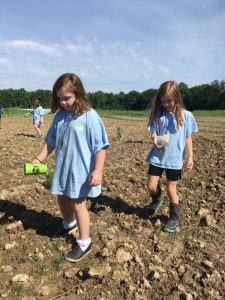
10:00am-10:30am: SWAP above (Or all do field work together)
10:30am-11:10am: Long hike (mowed trail) (BRITTANY break)
11:10am-12:00noon: LUNCH (shelter) camp songs. Commitment check-in
Introduced talent show concept for kids to plan.
Play outside: grass, sandbox, playground, peace garden
12:10pm-1:10pm: (location TBA) BIOBLITZ: Mark McCauley, Kim Gauen(wk 1)
CAMPERS BRING JOURNALS; ALL RECORD WHAT WE SEE/HEAR/ etc. Use foldable field guides: insects, trees, native flowers, butterflies and moths
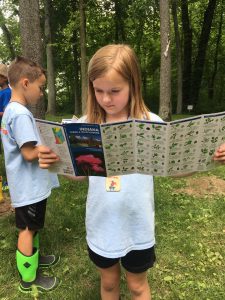
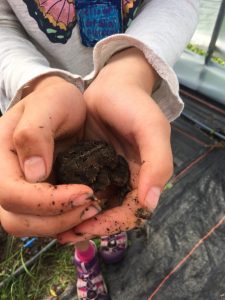
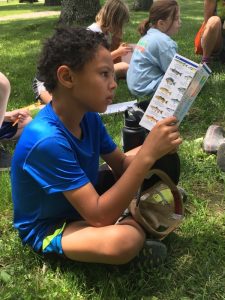
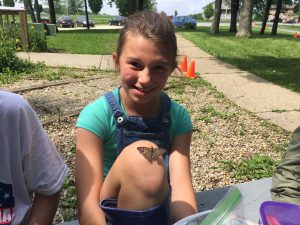
Bioblitz for 45 min hr and then 15 min for documenting/reflection/discussion.
1:15pm- 2:00pm: Wash hands, snack, play (Courtney break)
2:00pm-2:30pm: (chapel) Water break + Continue Sun prints / creative projects for Friday
(ALEX break until 2:30pm)
2:30pm-3:00pm: Outside play: 3 locations, 2 supervisors in addition to counselors.
3:00pm-3:25pm: (in lodge) Taste kohlrabi or kale from field. Group circle time.
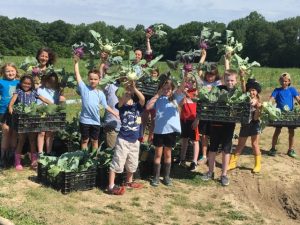
3:30pm: (lodge) Camper checkout
Day 4: the cycle of giving
At Check in: Campers go to assigned counselor (While waiting, campers sign thank yous for all of the week’s guests)
9:00am-9:10am: (Lodge) Welcome/Overview all together but sitting in groups with assigned counselor
Welcome back!
Celebrate: Cheer
Hey, hey, heeeeyy, let’s celebrate another day
Woo, hoo, hooooo, let’s grow together me and you
Bam bam baaaam, let’s take care of this precious land
Teeeeter Farm Camp, oh yeah!
Focus (be here, be now) kid yoga
9:10am-9:30am: (location: counselor choice) Morning connecting: in groups
Celebrations
Overview of day
Commitments
9:30am-10:00am: (shelter or lodge, depending on weather) 2 groups (half do A; half do B)
- GUEST: Anita Hagen from Hamilton County Harvest Food Pantry
- WEED in Peace Garden; PLANT thyme starts in the Peace Garden
ALEX’s and COURTNEY’s group: GUEST first (load in if anything)
BRITTANY’s group: WEED/PLANT first (load out if anything)
10:00am-10:30am: SWAP above activities
10:30-11:00am: Meal prep: Campers harvest dill, lemon balm, chives, basil. Campers peel garlic. These will go toward lemonade, iced tea and pickles for Friday meal.
11:00am-11:30am: LUNCH
11:35am-12:05pm: (shelter) Long hike to gather flowers for tomorrow’s party: hanging bouquet decorations for the Lodge(ALEX break)
12:10pm-12:40pm: Creative preparation for Friday celebration (ideas for groups to bond / create something to share at meal: create art, poetry, farm rap, farm chant, skit, farm dance)
Also have kids finish signing thank yous.
12:40pm-1:00pm: Connecting game (out on lawn)
1:05pm-1:55pm: Activity Choice (BRITTANY break until 1:40pm)
Outside: sand play, chalk play, tug of war, limbo, 3-legged races
Inside: friendship bracelets, games/puzzles
2:00pm-2:25pm: Wash hands, snack break (location weather dependent) (Courtney break)
2:30pm-2:50pm: (Meet on grass by Lodge parking lot) CSA Prep: Help Jonah carry things out to shelter for CSA Thursday evening.
2:50pm-3:20pm: (Location counselor choice) Afternoon circle time in groups: journal time + group connection / reflection
3:20pm-3:30pm: (Between shelter and playground) Whole group wrap up: celebrate day, camp song, cheer
3:30pm: (shelter) Camper check out
Day 5: farm hospitality
9:00am-9:10am: Welcome/Overview all together but sitting in groups with assigned counselor
Welcome back!
Celebrate: Cheer
Hey, hey, heeeeyy, let’s celebrate another day
Woo, hoo, hooooo, let’s grow together me and you
Bam bam baaaam, let’s take care of this precious land
Teeeeter Farm Camp, oh yeah!
Focus (be here, be now) kid yoga
9:10am-9:30am: Morning connecting: in groups (location: counselor choice)
Celebrations
Overview of day
Commitments
Macy/ME bring helpers to welcome, help load in
9:30am-10:00am: (shelter) GUEST: Conni Kolb, regional livestock farmer
10:00am-10:30am: Harvest kale with Jonah, farm manager
10:30am-11:00am: Kickball
11:00am-11:30am: LUNCH
FARM TO TABLE DINNER PREP 11:30am-3:15pm
This afternoon, we’ll have small groups of kids rotate in and out of the kitchen to help Chef Chris with specific doable tasks, preparing food for the farm to table dinner. While this is happening, the rest of the campers will do:
11:30am: tables and chairs out
12noon-12:30pm: Hike
12:30pm-1:00pm: Pick flowers to make a living runner and bouquets for the food table
1:00pm-1:30pm: Favorite games from the week (Beastmaster, Owls and crows, relay races, etc)
1:30pm-2:15pm: Wash hands, snack break (Courtney break)
2:15pm-3:00pm: Hay wagon ride with Farmer Jonah? (Decide alternative if not possible: write up dinner menu for families?)
3:05pm-3:20pm: (Lodge) Before guests come, wash hands, celebrate the week and all we learned
3:30pm-5:00pm: WELCOME GUESTS! Serve meal, share skits, songs, poetry, art. Take home journals, plants, artwork and poetry.
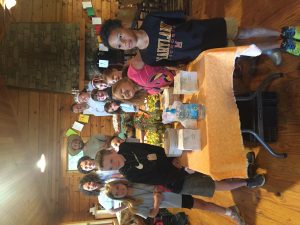
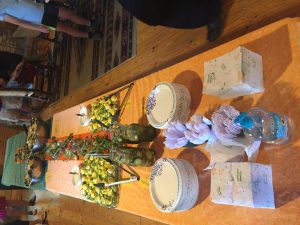
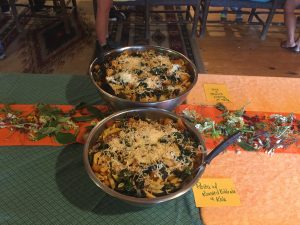
Registration lessons learned:
- Camp registration: find out if parents want siblings together.
- Special needs: Prior to registration, discern your capacity to provide adequate care and supervision for campers with special needs.
- We ended up stretching the age range of campers we accepted, on a case by case basis. Some 6 year olds turned out to be mature enough, while others’ lack of maturity demanded excessive counselor attention.
- Upon retrospect, separating younger campers from older campers (if we had enough of each) would have been optimum for pacing and lessons.
- Having a smaller group of campers the first week of camp helped us learn what needed to be adjusted for the larger group the following week.
- Like any on farm enterprise, it was important to make sure that we had the correct number of campers and counselors both to deliver quality programming and have a realistic budget.
Hiring lessons learned:
- We learned that calling references could have helped in our discernment of candidates.
- Hiring a nurse who also supervised campers throughout the day (not as a counselor, although she stepped in when needed) strengthened our counseling staff and served our campers well.
- We hired enough counselors to have a 7:1 ratio (campers to counselor). We did not count on counselors getting sick, though. After reflecting, we lean toward a 10:2 ratio with a co-counseling concept (10 campers to 2 counselors).
- Counselor candidates planning to go into teaching, as well as candidates with 4-H and sustainable agriculture interests proved to be excellent counselors.
- Two days of training counselors was sufficient, but an overnight together at the cabins could have provided more time to bond and connect with the farm and hiking trails before camp began.
Camp Days lessons learned:
- Timing: We learned we had to be flexible with timing of activities. Some activities took longer than anticipated, while others took less time than anticipated. We found it useful to have some camp songs or games in our “back pocket” for the times when activities took less time.
- Pacing: We learned that kids need “down time” during the camp day. Time for supervised, unstructured outdoor play was crucial for the kids and counselors.
- Counselor breaks: Our counselors each took a 20 minute break every day. We discovered that it was more refreshing if it was not at lunch time.
- Campers enthusiastically engaged in hands-on activities with farm manager each day. Flexibility enabled us to incorporate these activities into the schedule, as weather and farm manager duties varied.
- Daily plan vs. flexibility: We learned that we needed to be in communication about the daily plan, sometimes switching times of activities or reducing activities, depending on weather* and campers’ energy levels.
- Snacks: The second week, we offered a snack upon arrival for any camper who was hungry. This assured more engagement for those who had not eaten breakfast or who had gotten up early and were already hungry again.
- Journals: This turned out to be an activity welcomed by campers. They enjoyed taping plants (herbs, flowers, etc) they found on the farm into their journals. They wrote about things they learned that day or drew pictures inspired by the farm. They were free to write or draw whatever they wanted and could choose to share it with counselors or not.
- Lunch: we learned that campers got hungry earlier than we anticipated and pushed lunch earlier some days.
- Allow time for applying sunscreen and insect repellent once or twice a day.
- Activity locations: keep these in close proximity so that little ones’ legs don’t get too tired going from one activity to another.
- The farm to table meal was made possible by a volunteer chef working with campers in small groups throughout the final day of camp. Campers proudly shared the food they had harvested and prepared with their families.
- *Weather turned out to be an impactful variable this year. Cold temps and rain caused us to spend more time indoors than anticipated. We had to have backup indoor activities and then get outside when conditions allowed.
1.Teach sustainable agriculture practices through week-long hands-on activities with farmer Jonah and camp counselors on an organic farm.
2.Introduce youth to sustainable agriculture career opportunities via kids interviewing two farmers, a compost expert, and a beekeeper.
3.Give campers direct-marketing experience by harvesting and preparing for a CSA pickup.
4.Share the value of farm to table through the campers hosting a community meal for their families using vegetables they harvest on the farm.
5.Students share the week of learning through journals brought home at the end of the week, videos shown at farm to table dinner on the last day of camp, photos and text on Teter Organic Farm's website and Facebook page, as well as Teter Organic Farm Camp's Instagram account.
Cooperators
- (Educator)
- (Educator)
- (Educator)
- (Educator)
- (Educator)
Educational & Outreach Activities
Participation Summary:
- We created a website for the Farm Camp to inform parents about farm camp and provide them with information about the curriculum.
- We created a curriculum for the five days of camp. I plan to create a poster describing Teter Farm Camp to share at the 2020 Indiana Small Farms Conference.
- We engaged with Soil and Water staff, a beekeeper, vegetable and livestock farmers, additional adults who helped lead the BioBlitz, a chef, and our counseling staff to make this camp happen. Thirty-six campers attended, and their parents attended the farm to table meal on the final day of their camp week.
- We posted photos and excerpts about daily activities on our Teter Organic Farm Camp Instagram and Facebook page.
Learning Outcomes
Outcomes for Youth:
We used journaling and games to informally measure changes in knowledge, attitude, skills and awareness in our campers. After each learning activity and special guest, campers wrote in their journals. Most campers demonstrated understanding in the sustainable agriculture topics that were covered in our curriculum. Campers engaged in conversations with their counselors and fellow campers each day during reflection time about things they had learned. They also enjoyed fun competition in Owls and Crows games that tested their learning recall. The Bioblitz was an activity that helped synthesize some of the concepts learned during the camp. At the end of the week, the farm to table dinner which campers created with a chef was a culmination of their new knowledge, skills and awareness.
Numerous campers expressed a desire to return to farm camp next year. To us this signifies an increase in interest in sustainable agriculture.
Outcomes for Farm / Farmer:
While the primary objective our Organic Farm Camp was to educate youth about sustainable agriculture, we also learned about how educational programming can fit in the context of a working farm. We found that having a coordinator and staff that are solely devoted to delivering the educational curriculum was crucial both in delivering high quality and safe experiences for youth and ensuring that the regular farm work could be done. We found hands-on activities (harvesting, weeding, planting) were the most interesting and engaging for the youth. It was important for the farmer to schedule in time to work with the youth as a way for youth to have concrete farm experiences that they can carry on with them.
From a broader perspective, educational on farm programming can serve as an additional revenue stream to help balance the risk inherent with crop production. Youth programming has helped us build broader community interest and support both in Teter Organic Farm and sustainable agriculture in general.
Project Outcomes
Each week, multiple campers told counselors that they wanted to return to Teter Organic Farm Camp next summer. During the second week, two eleven-year old girls who were formerly repulsed by worms held red wigglers after the compost guest speaker’s talk and activity. That same week, more eleven-year old girls who did not like to get dirty reported enjoying harvesting and sorting lettuce, composting and learning about chickens.
If you are planning programming for a certain population, try and gather data on the level of interest from that population to help accurately predict enrollment and how to best structure your programming. For example, some families might be most interested in after-school programming, while others might be more interested in full day summer programming. It can be difficult to gauge interest levels anecdotally. It was difficult to gauge whether we would meet our enrollment goals, largely in part because some families don’t plan way in advance and also because we were introducing this camp for the first time. Work hard to offer incentives for early enrollment, and build those incentives into your budget.
-Do research on pricing, and if you need to, offer scholarships plan for this early on
-Insurance
-Support system of advisors (Safety, Child welfare / social worker, grade teacher, well connected parents)